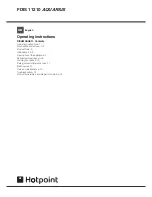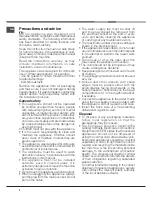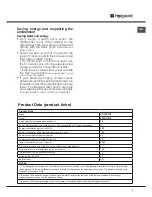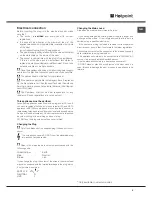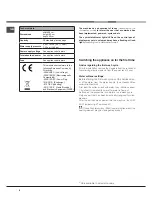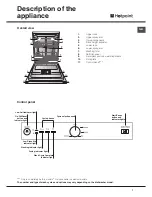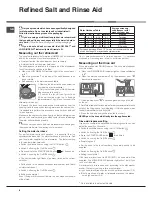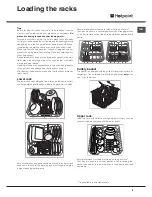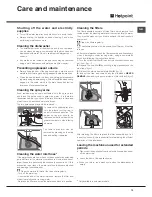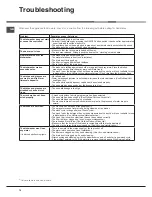
4
GB
If the appliance must be moved at any time, keep it in an
upright position; if absolutely necessary, it may be tilted onto
its back.
Positioning and levelling
1. Position the dishwasher on a level sturdy floor. If the floor is
uneven, the front feet of the appliance may be adjusted until
it reaches a horizontal position. If the appliance is levelled
correctly, it will be more stable and much less likely to move
or cause vibrations and noise while it is operating.
2. Before recessing the dishwasher, stick the adhesive
transparent strip
*
under the wooden shelf in order to protect
it from any condensation which may form.
3. Place the dishwasher so that its sides or back panel are in
contact with the adjacent cabinets or the wall. This appliance
can also be recessed under a single worktop
*
(see the
Assembly instruction sheet)
.
4
*
. To adjust the height of the rear foot, turn the red hexagonal
bushing on the lower central part at the front of the dishwasher
using a hexagonal spanner with an opening of 8 mm. Turn the
spanner in a clockwise direction to increase the height and
in an anticlockwise direction to decrease it.
(see Building-in
instruction sheet attached to the documentation)
The dishwasher meets the requirements set out by the regulations
in force concerning safety and electrical equipment.
Any technical checks should be conducted exclusively by a
trained and authorised technician: Repairs carried out by
unaithorised persons will invalidate the guarantee, as well as
posing a potential hazard to the user.
The manufacturer declines all responsibility for damage to
persons or property resulting from failure to observe the above
precautions, from tampering with even a single component or
from the use of non-original spare parts.
Connecting the water supply
Adaptation of the water supply for installation should only
be performed by a qualified technician.
The water inlet and outlet hoses may be positioned towards
the right or the left in order to achieve the best possible
installation.
Make sure the dishwasher does not bend or squash the hoses.
Connecting the water inlet hose
• To a 3/4” gas cold or hot water connection point (max.
60°C).
• Run the water until it is perfectly clear.
• Screw the inlet hose tightly into position and turn off the
tap.
If the inlet hose is not long enough, contact a specialist
store or an authorised technician
(see Repairs and After
Sales)
.
The water pressure must be within the values indicated
in the Technical Data table - otherwise the dishwasher may
be function properly.
Make sure the hose is not bent, compressed or kinked.
DO NOT overtighten the hose connector, hand tight is
sufficient.
Tap connections*: A range of adaptors are available to
suit your tap.
Connecting the drain hose
Connect the drain hose (without bending) to a drain duct with
a minimum diameter of 2 cm. (A)
The drain hose connection must be at a height ranging from
40 to 80 cm (from 15’’ to 31’’) from the floor or surface where
the dishwasher rests.
• before connecting the drain hose, remove any internal
restrictions; this will prevent a build up of debris which
could cause a blockage.
• remove any restrictions from the waste spigot and ensure
that the sealing bung is removed (B).
It MUST NOT be connected to a surface water drain.
Ensure the drain hose is securely
attached, to prevent it coming away
while the machine is in use and
causing a flood.
Fit hose to waste securely using
a “Jubilee” type
clip.
Anti-flooding protection
To ensure floods do not occur, the dishwasher:
- is provided with a special system which blocks the water
supply in the event of anomalies or leaks from inside the
appliance.
Some models are also equipped with the supplementary
safety device
New Acqua Stop*
, which guarantees anti-
flooding protection even in the event of a supply hose rupture.
WARNING: HAZARDOUS VOLTAGE!
Under no circumstances should the water inlet hose be cut
as it contains live electrical parts.
Installation
MIN 40 cm
MAX 80 cm
*
Only available in selected models.

